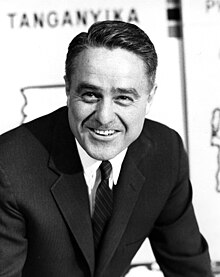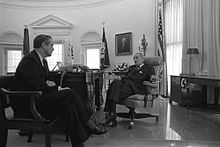Sargent Shriver
Robert Sargent Shriver Jr. (born November 9, 1915 in Westminster , Carroll County , Maryland , † January 18, 2011 in Bethesda , Maryland) was an American politician ( Democratic Party ). Closely associated with the Kennedy family , worked for the Democratic Presidents John F. Kennedy and Lyndon B. Johnson primarily as an organizer of socio-political initiatives and ambassador in Paris; In 1972 he ran for Vice President of the USA .
Family, education and work
Shriver's ancestors came from Germany, where their name had been Schreiber , and emigrated to what was then the British colony of Maryland in 1721 ; the ancestor David Shriver was one of the signatories of the Maryland Constitution in 1776. The Catholic family belonged to the local elite without having any wealth. The son of banker Robert Shriver and his wife Hilda attended the Canterbury School in New Milford (Connecticut) on a scholarship and spent the summer of 1934 in Germany on the Experiment in International Living exchange program . In the fall of 1934, Shriver began studying at Yale University , where he became editor-in-chief of the Yale Daily News, and graduated in 1938. He then moved to Yale Law School . In 1940 Shriver co-founded the America First Committee , which opposed US entry into World War II . He later revised his opinion and registered for military service; after graduating from Law School in 1941, he was drafted and served in various positions in the United States Navy , including on the USS South Dakota (BB-57) in the 1942 Battle of the Santa Cruz Islands and the Naval Battle of Guadalcanal ; for his wound there he received the Purple Heart . In 1943 he trained as a submarine torpedo officer .
After the end of the Second World War he worked briefly as a lawyer for a major New York law firm , became a journalist for Newsweek magazine and met Joseph P. Kennedy , the father of the famous politician brothers, who first worked for his companies in New York and from 1947 in Chicago (as manager of the Merchandise Mart ) worked. Shriver became part of the Kennedy family network , especially since he met their daughter Eunice , with whom he carried out social projects and whom he married on May 23, 1953. They were married by Francis Spellman in St. Patrick's Cathedral (New York) . The couple settled in Chicago; he was involved there for the Catholic Interracial Committee and the Chicago Board of Education . They had five children, including Arnold Schwarzenegger's former wife , Maria Shriver . After his political career, he joined the major law firm Fried & Frank in 1971 as a partner , of which he was a member until 1986. Eunice Shriver gave the impetus to found the Special Olympics , of which Sargent Shriver became president in 1984.
Political career
As his biographer Scott Stossel describes, Shriver's career was determined by his close ties to the Kennedy family: This gave him access to high positions, but at the same time was limited in his advancement; For example, he renounced the candidacies as governor of Illinois in 1960 and 1964 and as US vice-president in 1968 and settled for altruistic positions in the political background so as not to endanger the ambitions of the Kennedys. In the code of the Democrats for the 1960 presidential election organized Shriver for his brother John F. Kennedy , the primarys in Wisconsin and West Virginia . After Kennedy's election victory, Shriver headed the body during the transition of the presidency that sought personnel for senior positions in the new administration .
From 1961 to 1966 he was the first director of the Peace Corps established by President Kennedy . Shriver campaigned for an expansion of the welfare state. In the government of President Lyndon B. Johnson he was one of the architects of the large-scale War on Poverty (part of the Great Society agenda). As the first director of the Office of Economic Opportunity (1964–1968), Shriver was responsible in particular for developing the Job Corps (modeled on the Civilian Conservation Corps ) and the Head Start program. In 1967 he founded the Sargent Shriver National Center on Poverty Law in Chicago, which is still in existence today and aims to give poor people access to the justice system.
From 1968 to 1970 Shriver was the US ambassador to France . Relations between the countries were strained, among other things, by Charles de Gaulle's decision in 1966 to withdraw France militarily from the western defense alliance NATO ; Shriver's diplomatic work amid general strikes and the Paris May riots is credited with easing the tension and returning to a sustainable working relationship. During this time he considered candidacies for various political offices and, on his return to the USA in 1970, founded the organization Congressional Leadership for the Future , which, apart from the party organization, gave nationwide support to democratic congress candidates for the 1970 mid-term elections ; Shriver performed in all parts of the country.
In the 1972 presidential election , he was the Democratic candidate for the vice presidency as running mate of presidential candidate George McGovern . He was only chosen after the original candidate, Senator Thomas Eagleton from Missouri, had to withdraw his application. It had become known that Eagleton had received electroshock therapy for depression. Shriver was considered after six prominent Democratic politicians had already turned them down. In the election, McGovern and Shriver suffered one of the clearest defeats in US history with 37.5 percent of the vote. The Republican incumbent Richard Nixon was elected with a large majority.
In the 1976 election , Shriver tried to become a presidential candidate for the Democrats and relied on an ethical renewal of political culture after the Watergate scandal , but failed in the primaries. He achieved double-digit results only in the Primarys in Vermont (28 percent) and Illinois (16 percent); In both states, the later nominated and also in the election victorious Jimmy Carter took first place. Thereupon Shriver, who had never been elected to any office or mandate, withdrew from active politics.
Political positions
Shriver campaigned for an expansion of the welfare state and for the economically and socially marginalized. The Catholic, who was mostly left-wing liberal in socio-political issues, however - together with his wife and unlike her brother Ted Kennedy - spoke out against abortions ( pro-life ).
Awards and reception
In 1966, Shriver received the Pacem in Terris Award , a peace award given by the Diocese of Davenport . In 1993, the spouses were Shriver with the award freedom from want of Franklin and Eleanor Roosevelt Institute awarded. In December of that year, the University of Maryland, Baltimore County founded the Shriver Center in honor of the Shriver couple , which works to improve education in urban centers in the United States. On August 8, 1994, US President Bill Clinton presented Shriver with the Presidential Medal of Freedom , the highest civilian honor in the United States. His wife had received this award in 1984 from Ronald Reagan ; they are the only married couple in which both partners have received the medal individually. Shriver's five children founded the Sargent Shriver Peace Institute , which aims to honor and further promote his social and foreign policy initiatives.
The Atlantic in 2004 -Journalist Scott Stossel wrote a biography of Shriver, which was reissued by Shriver's death 2011th In 2004, daughter Maria Shriver published the children's book What's Happening to Grandpa? in which she took up her father 's Alzheimer's disease and which became the template for an HBO television series about the disease in 2009 . On January 21, 2008, the documentary "American Idealist" was broadcast on PBS , which traces Shriver's life's work. In 2012, the son Mark published his memories of the father under the title A Good Man .
During the 1960s, Shriver was ridiculed by many political observers for his commitment to voluntary service to society, and during this tense period of the Vietnam War , the climax of the systematic confrontation of the Cold War and violent clashes in the wake of the civil rights movement, Shriver was referred to as " Quijottish ". His biographer Scott Stossel has called Shriver one of the most underrated political figures of the 20th century. Shriver's work was recognized in the New York Times obituary as one of the lasting traces of Kennedy-era idealism. On the occasion of his death, President Barack Obama described him as “the embodiment of the idea of public service”.
Shriver's estate is in the John F. Kennedy Library in Boston.
literature
- Scott Stossel: Sarge: The Life and Times of Sargent Shriver. Other Press, New York 2011 (first at Smithsonian, 2004).
Web links
- Sarge's work. In: Sargent Shriver Peace Institute (English).
- R. Sargent Shriver. Biography. In: JFKLibrary.org (English)
- Scott Stossel: The Good Works of Sargent Shriver. In: The Atlantic , January 18, 2011 (English)
- Robert D. McFadden: R. Sargent Shriver, Peace Corps Leader, Dies at 95. In: The New York Times , January 18, 2011 (English)
Individual evidence
- ↑ a b c d e f g h i Robert D. McFadden: R. Sargent Shriver, Peace Corps Leader, Dies at 95. In: The New York Times , January 18, 2011.
- ↑ a b c d e f R. Sargent Shriver. Biography. In: JFKLibrary.org .
- ↑ In Memoriam - Sargent Shriver. In: FriedFrank.com , January 18, 2011.
- ↑ In detail Scott Stossel: “Knifed”. In: The Atlantic , May 2004.
- ^ Kate Rockwood: Shriver Center celebrates 50 years — and looks toward the future. In: ABA Journal , November 1, 2017; Web presence of the center.
- ↑ Scott Stossel: Sarge , New York 2011, Chapter 38: Springtime in Paris (preview) .
- ↑ Deacon Keith Fournier: Pro-Life Liberal Sargent Shriver Dies; Democratic Challenger to Obama Emerges. In: Catholic Online , Jan. 20, 2011.
- ^ Pacem In Terris (Peace On Earth) Award Recipients: R. Sargent Shriver. In: DavenportDiocese.org .
- ^ History. In: Shrivercenter.UMBC.edu .
- ^ Lisa Riley: Sargent Shriver Peace Institute Donates $ 1,000,000 to Chicago-based Advocacy Organization. In: ShriverCenter.org , May 10, 2012.
- ↑ Joey Bartolomeo: Maria Shriver: My Father Doesn't Recognize Me. In: People , June 5, 2009.
- ↑ American Idealist. In: SargentShriver.org .
- ^ Reeve Lindbergh: "A Good Man: Rediscovering My Father, Sargent Shriver" by Mark K. Shriver. In: The Washington Post , July 13, 2012.
- ^ Scott Stossel: The Good Works of Sargent Shriver. In: The Atlantic , January 18, 2011.
- ^ Barack Obama: Statement by the President on the Passing of Sargent Shriver. Press release. In: WhiteHouse.gov , January 18, 2011.
- ^ Sargent Shriver Papers, 1948-1976. In: The National Archives Catalog .
| personal data | |
|---|---|
| SURNAME | Shriver, Sargent |
| ALTERNATIVE NAMES | Robert Sargent Shriver Jr. |
| BRIEF DESCRIPTION | American politician |
| DATE OF BIRTH | November 9, 1915 |
| PLACE OF BIRTH | Westminster , Maryland |
| DATE OF DEATH | January 18, 2011 |
| Place of death | Bethesda , Maryland |






